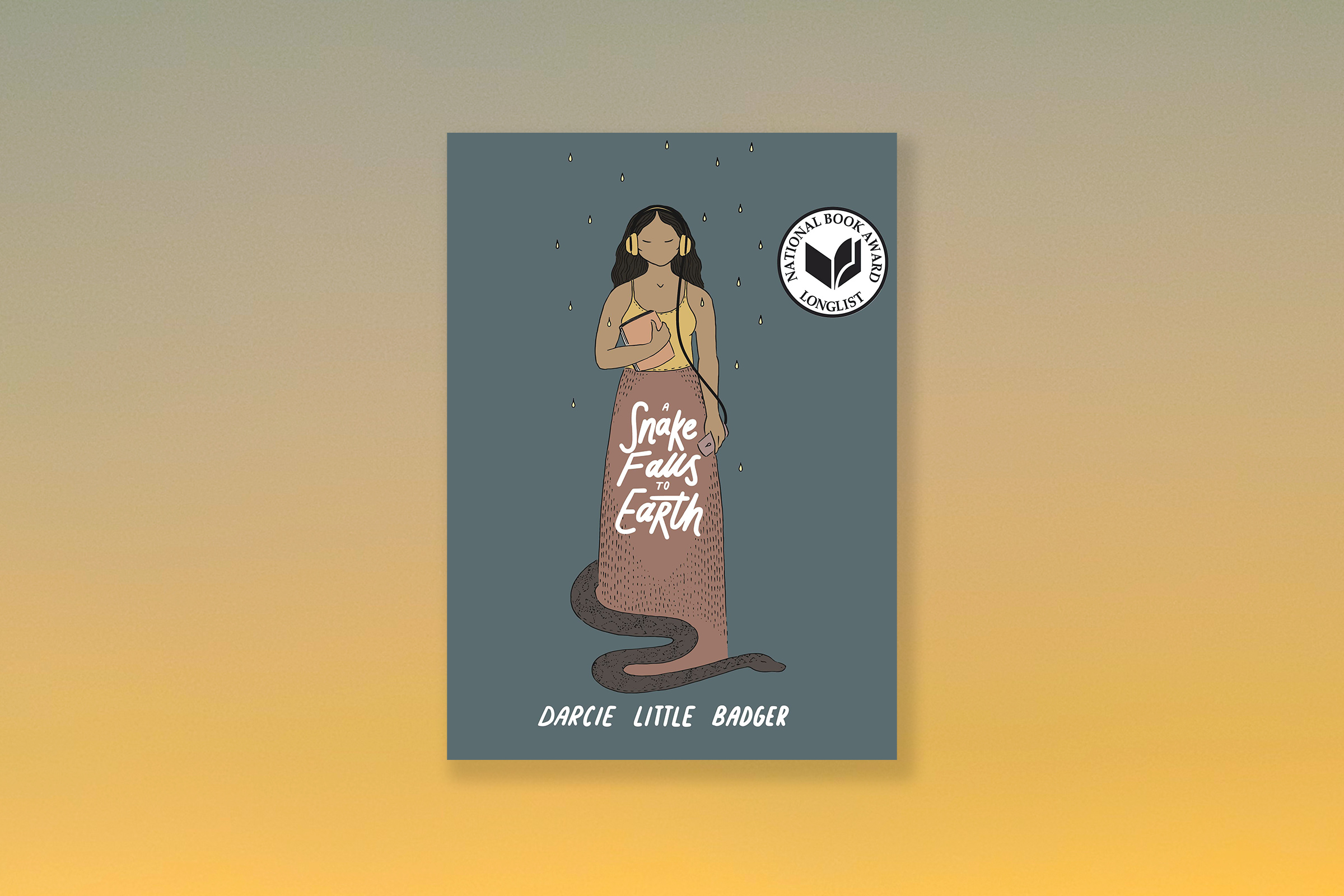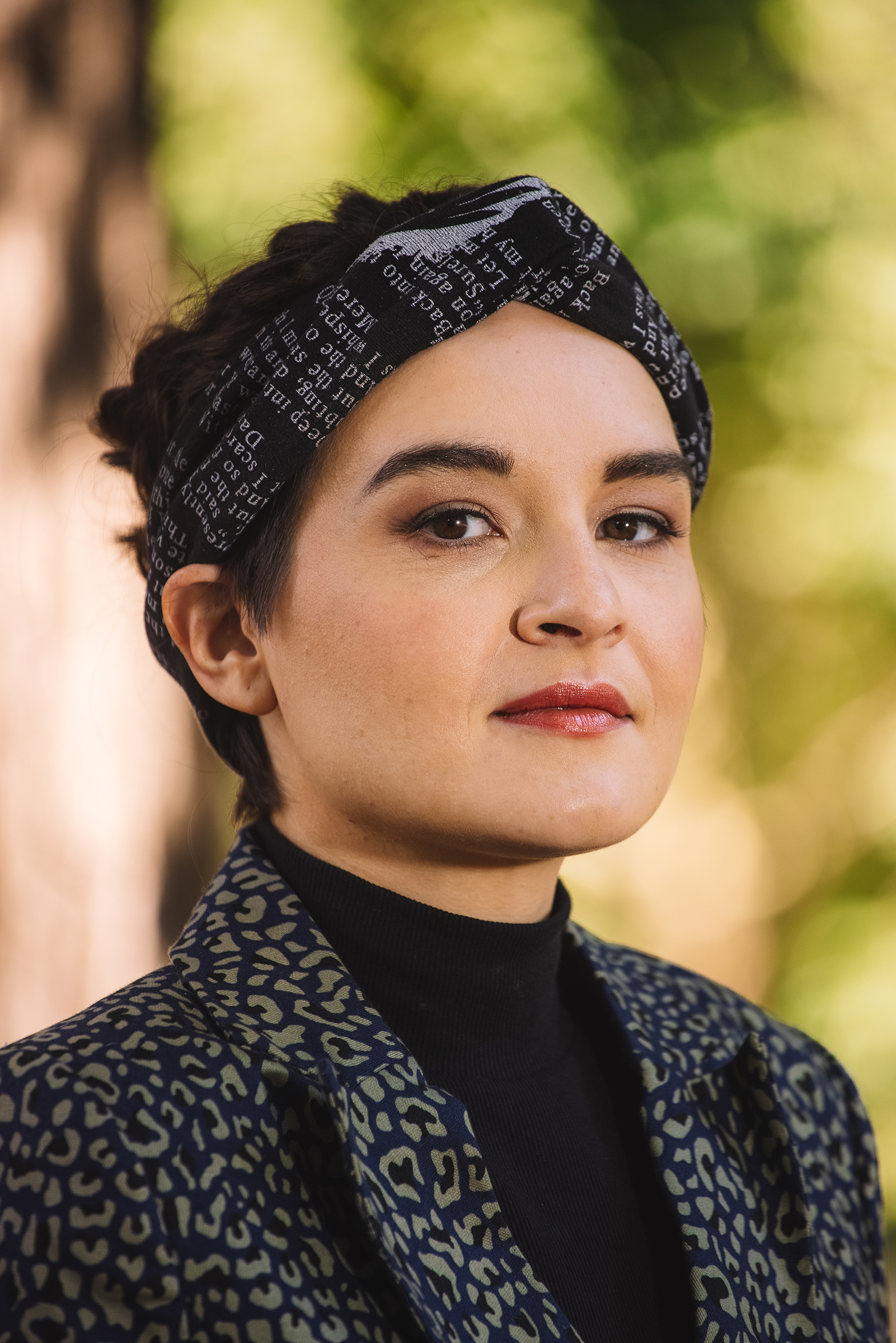
Darcie Little Badger has been shaped by stories—the stories passed down to her through generations of family members, the stories she devoured as a fantasy-obsessed kid, the stories she now writes in books for young adults. And, of course, the story that gave her her name. She was born Darcie Erin Ryan—Little Badger coming, in the tradition of the Lipan Apache tribe, upon graduation from high school. “Badger” is an important figure in the tribe’s origin narrative, which says that at first, the earth was empty—and then the creatures of the world below set out to explore it. Pausing on a park bench in Brooklyn, the author describes the significance of her namesake. “Badger is the animal person who went up to earth and was responsible enough to then go back down,” she explains, “and say, ‘Hey, y’all should go see this thing!’ ”
Exploring the mysteries of the planet—and the beings that may exist beyond our comprehension—is what anchors Little Badger’s acclaimed young-adult fiction. Her books sink into the depths of humanity’s darkest realities—gun violence, grief, our destruction of the planet—but also imagine the spirits, ghosts and animals that could exist alongside us. Her second young-adult novel, A Snake Falls to Earth, is a coming-of-age fantasy-thriller that flips between the perspective of an asexual teenage Lipan Apache girl and a cottonmouth snake. The book, to be published Nov. 23, was long-listed for this year’s National Book Award for Young People’s Literature. And like her debut, Elatsoe, which was published to fanfare in 2020, Little Badger’s new genre-bending narrative draws on her heritage and the tradition of story-telling that has informed her worldview.
Read More: The 100 Best YA Books of All Time
“For Native readers, especially Lipan Apache readers, I do hope that they are able to see more of their culture than they have in the past,” says the 34-year-old author. “And for non-Native readers, I hope that they’re able to connect to this character and learn a little bit.”
The Lipan Apache have long lived on the land that is now Texas. Although Little Badger was raised in several places around the world, moving because of her father’s job, she considers Texas to be home. Growing up, she worked her way through the fantasy sections of each local library. When she was in the first grade, she wrote her first book, a 40-page mystery involving a murdered garden and opals in an attic. Her father, who was pursuing a Ph.D. in English at the time, helped her send the manuscript to a publisher. They responded with a kindly rejection letter. Her father had it framed. “He wanted me to see how far I would go someday,” she says, adding, “It’s good to learn as a writer you’re going to deal with rejections.”
She carried that lesson with her to college at Princeton. After trying two years in a row to be accepted into the school’s creative-writing program, and being turned down both times, Little Badger pivoted to another subject that had piqued her interest: earth science.
An introduction to oceanography course left her wondering about all the parts of the world she never knew existed. On a research trip to Bermuda, Little Badger traveled on a small vessel to the deep ocean. She hopped in the water and swam, floating hundreds of meters above the ocean floor. “It was dark underneath my feet, and I felt myself being pulled in,” she says, bright-eyed as she remembers how it felt. “Even though that was actually quite scary, it was also thrilling, because I realized I had no idea what was under my feet—and I really wanted to understand more.” She went on to earn a Ph.D. in oceanography, then took a job editing earth science papers. In 2017, she started writing her first novel on the side.
Little Badger’s fascination with the natural world, particularly her study of climate science, has proved pivotal in her fiction. It comes through clearly in A Snake Falls to Earth, part of which is set in an alternate version of near future Texas, where hurricanes and natural disasters are happening with an alarming and ever-increasing frequency. Any resemblance to the extreme weather that has grown more and more frequent in the real world is entirely deliberate. “It’s a real concern for young people, who have unfortunately inherited this state of the world,” Little Badger says.

She thinks a lot about young people and the struggles they face. “Teens are intelligent, they’re emotionally complex, and they’re experiencing many things for the first time,” she says. She admits that writing adolescent characters gets more challenging with age, as she gets further and further from that period in her own life. “I am not always up on the current terms,” she says, “but I hope my respect for them shines through.”
Sometimes, young aspiring writers will tell Little Badger that they are in too much pain to write. The advice she gives them is not to force it, especially in the wake of everything they’ve had to deal with over the past few years.
But for Little Badger herself, the process of writing A Snake Falls to Earth helped her understand how writing can be a way to cope with trauma. Around the same time she sold Elatsoe, in late 2018, Little Badger learned that her father had been diagnosed with terminal mesothelioma. By March 2020, his condition had worsened. Little Badger quit her day job and moved temporarily to Connecticut to help care for him, alongside her mother and her brother. She started writing A Snake Falls to Earth while her father was in and out of the ICU. Working on the book, which is full of so many imaginative and fantastical elements, provided her with moments to escape the sadness that consumed her life.
Read More: The 100 Best Fantasy Books of All Time
Although her father didn’t read much of her favorite genre while she was growing up, he always encouraged her to explore the stories she wanted to tell. “I wanted to finish it in time for him to read it, but it didn’t work out that way,” she says. She finished a first draft of the book a few months after her father died. But he was able to see one of the first copies of Elatsoe in those final months—it was one of the last times she remembers him smiling.
Despite writing A Snake Falls to Earth in a period of deep personal pain, and amid a global pandemic, Little Badger unfolds a narrative that manages to be hopeful, fun and adventurous. It also takes cues from the Lipan Apache origin story.

Protagonist Nina, living in that grim near future version of Texas, is desperate to translate a story in a language she doesn’t quite understand—one passed down from her great-great-grandmother about animal people that live on earth. The story will be lost to time if she can’t figure out how to read it. And she’s certain that the little she understands of it is true—that animal people exist. Her theories are confirmed when she crosses paths with a snake person named Oli. Oli is from the Reflecting World, a magical land of spirits and monsters, and he has come to earth on a mission. His best friend is gravely ill, and he needs Nina’s help to save him.
Nina is relentlessly optimistic, despite it all. She never stops searching for answers about her great-great-grandmother’s story—there’s an underlying message of hope in her determination, her belief that she can preserve something sacred.
Little Badger remains optimistic too. “There’s this sense of almost fatalism, that the world is going to end,” she says. “The way I think about it is: maybe. But my responsibility is to fight for the best version of the future that I can.”
More Must-Reads from TIME
- Inside Elon Musk’s War on Washington
- Meet the 2025 Women of the Year
- The Harsh Truth About Disability Inclusion
- Why Do More Young Adults Have Cancer?
- Colman Domingo Leads With Radical Love
- How to Get Better at Doing Things Alone
- Cecily Strong on Goober the Clown
- Column: The Rise of America’s Broligarchy
Write to Annabel Gutterman at annabel.gutterman@time.com